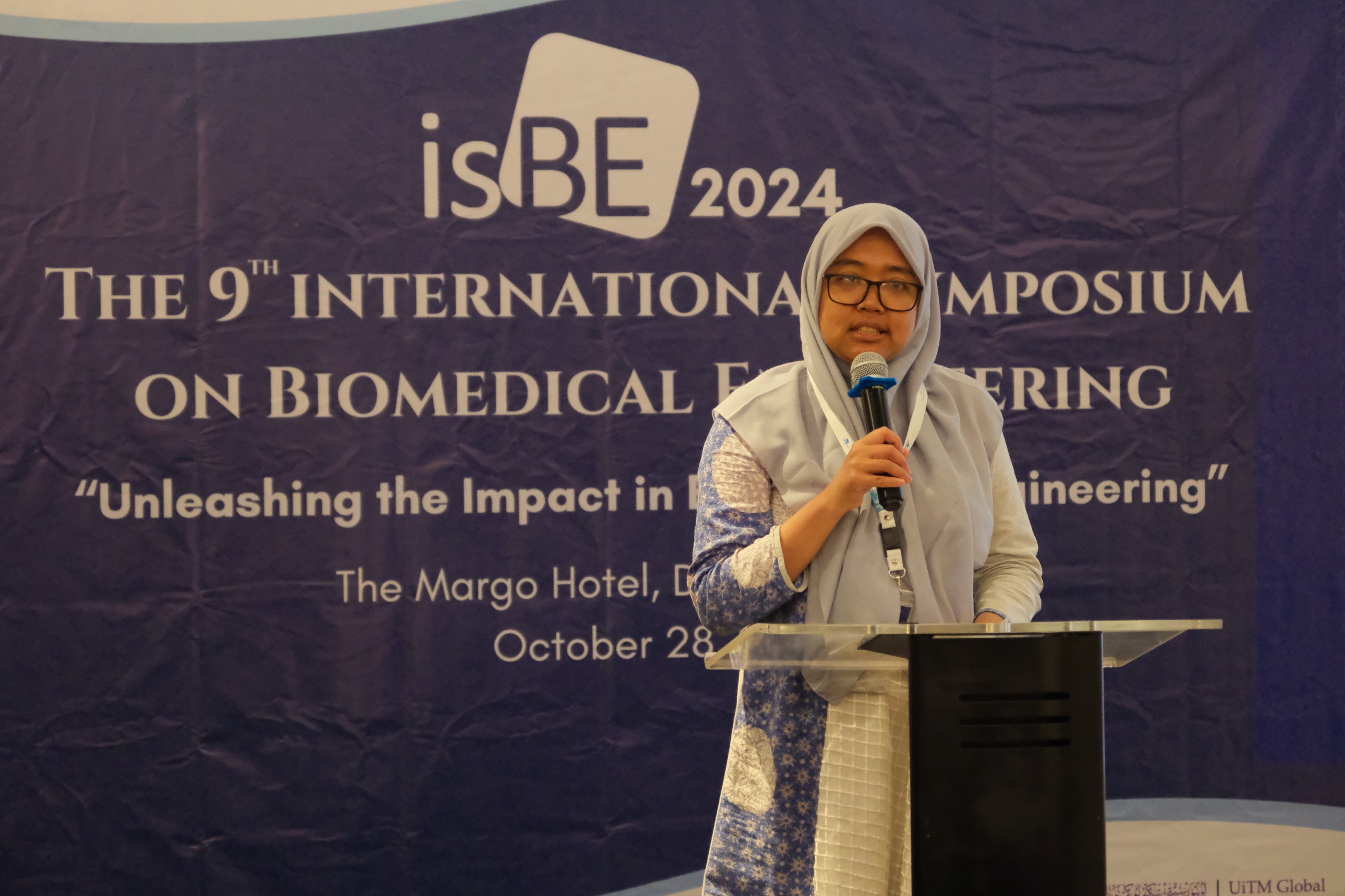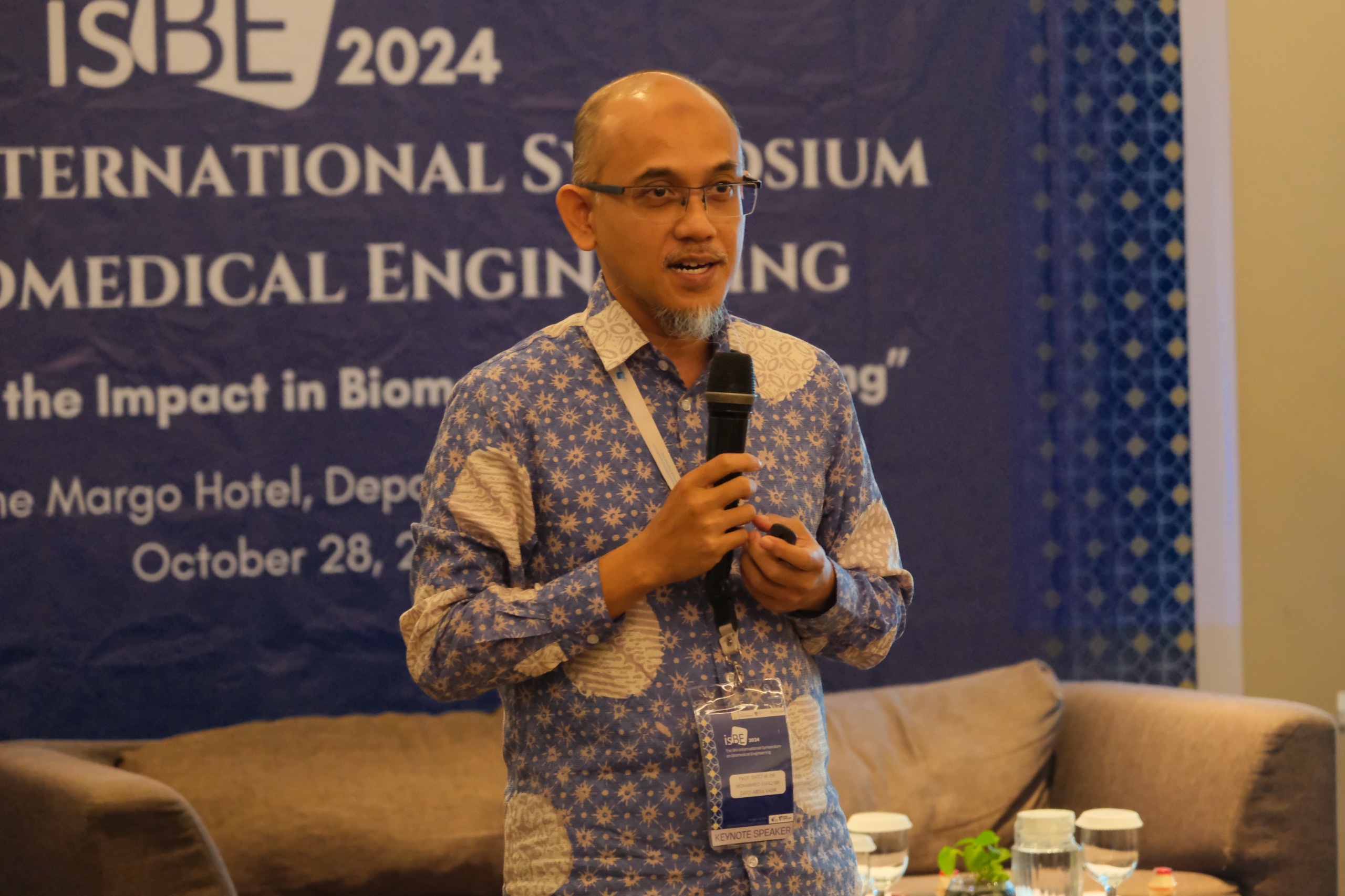This year’s ISBE adopted the theme “Unleashing the Impact in Biomedical Engineering,” bringing researchers in biomedical engineering together to share their studies and publications. This year’s symposium was again held in collaboration with Universiti Teknologi MARA, Malaysia.
The event began with opening remarks from the Chair of ISBE 2024, Dr. Kenny Lischer, S.T., M.T., Ph.D., followed by the Head of FTUI’s Interdisciplinary Engineering Research Unit, Prof. Dr. Ir. Widodo Wahyu Purwanto, DEA., who officially opened ISBE 2024.
“The theme Unleashing the Impact in Biomedical Engineering is very relevant to the current challenges and opportunities in the field. This conference provides a platform for academics, researchers, and practitioners to share innovative findings, not only expanding our understanding of health technologies but also creating wider collaboration opportunities. As the contribution of biomedical engineering becomes increasingly essential in improving quality of life, we hope this symposium can drive real and sustainable solutions for the medical world,” said Prof. Dr. Heri Hermansyah, ST., M.Eng., IPU, Dean of FTUI, in a separate statement.
In the Keynote Session, there were three main speakers: Prof. Peter V.S. Lee from the University of Melbourne, with a topic titled “A Patient-Centric Framework for Developing Safer 3D Printed Personalized Medical Implants”; Prof. Mohammed Rafiq bin Dato’ Abdul Kadir from Universiti Teknologi MARA Malaysia, discussing “Unleashing the Impact in Biomedical Engineering”; and Dr. Sugeng Supriadi from the Faculty of Engineering, Universitas Indonesia, with the topic “Innovation in Biomaterial Products: Implants with Ecosystem.”
Keynote speaker 1, Peter V.S. Lee from the University of Melbourne, discussed advancements in personalized medical implants using computer-assisted design, additive manufacturing, and antibacterial coating. While there has been progress in custom orthopaedic and maxillofacial surgery implants, significant challenges remain for commercializing and widely adopting personalized implants. Lee proposed a “Measure-Model-Manufacture-Manage (4M)” framework that leverages patient biomechanical measurements to create a model that optimizes implant design before 3D printing and implementation, aiming to improve patient management and outcomes through a comprehensive approach.
Keynote speaker 2, Prof. Mohammed Rafiq from Universiti Teknologi MARA Malaysia, explored advances in biomedical engineering, particularly in computational biomechanics, advanced biomaterials, biomimicry, and the transformational role of artificial intelligence (AI) in healthcare. Computational biomechanics enables modelling and simulating the behaviour of biological tissues, aiding in medical device design and surgical procedures. Coupled with advanced biomaterials, like biodegradable polymers and nanocomposites, these approaches allow for the development of next-generation implants that mimic the mechanical properties of human tissues. Biomimetic principles and AI-driven computational tools also promote personalized healthcare, optimizing patient outcomes and medical research.
Keynote speaker 3, Dr. Sugeng Supriadi from Universitas Indonesia, focused on developing innovative orthopaedic implants using titanium and magnesium alloys. These alloys are known for their biocompatibility, strength, and corrosion resistance, making them ideal for long-term medical applications. Magnesium alloys also hold great potential for degradable implants, reducing the need for secondary surgeries. This research emphasizes the importance of adhering to ISO 13485 standards in design, manufacturing, and testing to ensure medical device safety and quality. 3D printing technology was also highlighted as a promising innovation for producing highly customized implants, especially in oncology cases. Collaboration within Indonesia’s orthopaedic implant ecosystem was identified as key to successful product commercialization.
A total of 34 papers from participants representing four countries—Indonesia, Malaysia, the Philippines, and Japan—were presented at the conference. The papers were divided into four major topics: Medical Devices, Drug Delivery and Development, Biomaterial and Tissue Engineering, and Clinical & Health Management. The presented papers will undergo review and be published in a Scopus-indexed international journal.
***
Public Communication Office
Faculty of Engineering, Universitas Indonesia












